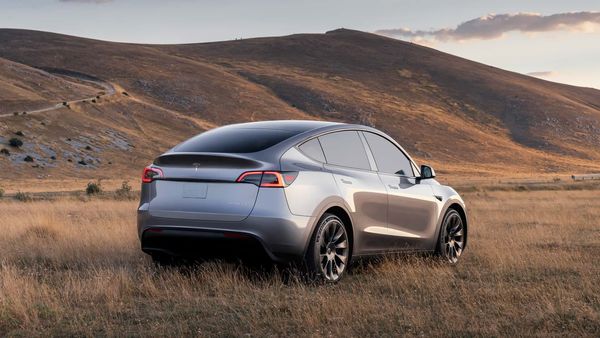
Japanese automaker Toyota (TM) has earned its reputation by making some of the most ubiquitous and high-quality cars and trucks roaming American roads. Still, one notable thing about the popular brand is the company's electric vehicle offerings—or lack thereof.
While other huge automakers like General Motors, Hyundai, and Kia provide various EVs in different sizes and shapes for their customers in the United States, the Toyota brand offers just one electric vehicle in its lineup: the bZ4X crossover SUV.
💰💸 Don't miss the move: Subscribe to TheStreet's free daily newsletter 💰💸
According to Cox Automotive, EVs made up just 8.1% of the total number of cars sold in 2024. By offering a mixture of vehicles, including gas and hybrid cars, Toyota is in a secure and advantageous position compared to manufacturers solely selling EVs.
However, a new report showed that Toyota wanted to keep the advantage for itself and was willing to help the mouthpieces that would drive customers to cars like the ones they sell best.

Toyota, the statesman
According to a report released by Public Citizen, Toyota was the most prominent auto company that bankrolled the campaigns of 'climate deniers' in the U.S. Congress.
In their analysis, the nonprofit looked at political donations made by Political Action Committees (PACs) associated with the U.S. auto industry and found that the Japanese automaker gave the most to these tendentious politicians over the last three election cycles.
Public Citizen classifies politicians as "Climate Deniers" using the Center of American Progress's definition, which uses the level for congressional members who have demonstrated rhetorical tactics like "climate doomism" — stating nothing can be done about reversing climate change — and portraying "climate activism as alarmism, and [Congressional members] who downplayed the need to act to address climate change."
In the last three election cycles, the nonprofit identified 169 Congresspeople — all Republicans — who have been somewhat public with their doubts about climate change. Toyota financially supported the campaigns of 143 of said 169 candidates, donating $810,000.
In just the most recent cycle, the November 2024 elections, PC found that Toyota gave a total of $271,000 to 62 candidates.
The Japanese automaker's contributions to the American politicians eclipsed those made by Detroit automakers. Toyota's donations were nine times as much as Ford's (which gave $29,500) and more than twice as much as GM's ($128,500).
More Automotive:
- Carvana under fire: Research report claims turnaround is a "mirage"
- Trump's trade policies may ruin this emerging new car segment
- Frugal motorists are giving lube and tire shops a tough fight
A few hundred grand may be big bucks to ordinary people like you and me, but it is barely a drop in the bucket for a company whose revenue tops hundreds of billions every year.
Unfortunately, a "little money" goes very far.
According to Public Citizen's report, Toyota's contributions have gone toward a murderer's row of congresspeople that have a significant mouthpiece.
One such member is House Speaker Mike Johnson (R-LA); whom besides harboring other classically conservative views on key topics, has been outspokenly vocal against human-caused climate change and openly denied that human's use of cars has any effect.
“The climate is changing, but the question is, is it being caused by natural cycles in the atmosphere over the span of the Earth’s history? Or is it changing because we drive SUVs? I don’t believe in the latter. I don’t think that’s the primary driver," he said at a 2017 town hall.
Toyota's political actions mirror its actual activism
Although some may be quick to label Toyota's support of American Republican political candidates as an endorsement of very divisive values that drivers of its vehicles do not support, it should be noted that the moves support one of its agendas: to make money with vehicles it knows that sell.
According to Toyota, it sold 1,006,461 "electrified vehicles" in 2024, accounting for 43.1% of its total sales volume.
Toyota uses the umbrella term "electrified vehicles" to refer to the 30 gas-electric hybrids, plug-in hybrids, and EVs it sells across its Toyota and Lexus brands. It brags that it offers the most of such vehicles, but in reality, 28 of them use gas (albeit somewhat less of it).
Although EVs are touted as an emissions-free alternative to gas-powered cars, Toyota envisions a "multi-pathway powertrain approach" where customers can still own gas-powered cars, and its executives have stressed it every step of the way.
Related: Toyota exec slams "impossible" EV mandate amidst political chaos
A few days after the U.S. Presidential election that took place in November 2024, Toyota Motor North America (TMNA) chief operating officer Jack Hollis expressed that the "EV mandates" that are due to take effect in 2025 are “impossible” for automakers like Toyota to meet and mess with its customer's freedom to choose.
Toyota chairman Akio Toyoda has also been a longtime skeptic, arguing numerous times that there are multiple ways to tackle the threat of carbon emissions without sacrificing people's mobility.
In a statement at a Toyota company event in January 2024, the Chairman argued that EVs "come as a set with infrastructure," arguing that many of its customers live in parts of the world with little to access to electricity.
"No matter how much progress BEVs make, I think they will still only have a 30 % market share," said Toyoda. "Then, the remaining 70% will be HEVs [hybrid-electric vehicles], FCEVs [fuel cell electric vehicles], and hydrogen engines. And I think [gas] engine cars will definitely remain."
"I think this is something that customers and the market will decide, not regulatory values or political power."
Toyota trades on the New York Stock Exchange under the ticker TM.
Related: Veteran fund manager issues dire S&P 500 warning for 2025







